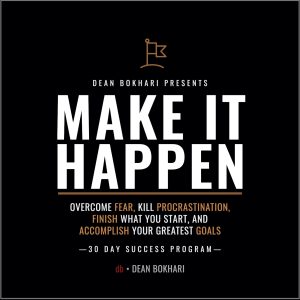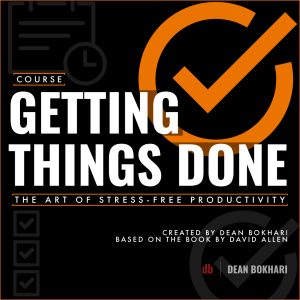It’s that time of year again when millions of people start setting New Year’s goals. Sadly, however, just a month or two later, most of these New Year’s goals, resolutions, and habits will have been forgotten about or given-up on. But not with you. Why? Because you’re about to discover some of the most common mistakes people make when setting New Year’s goals—and how to avoid them. Let’s dive right in. Start reading or listening below.
Listen elsewhere: Apple Podcasts | Spotify | Overcast | Google Podcasts | MP3
Table of contents
- You’re setting too many new year’s goals.
- You’re aiming too high, or too low.
- You’re not setting deadlines for your new year’s goals.
- You’re not keeping your goals visible.
- You’re setting resolutions (rather than goals or habits).
- You’re not creating contingency plans.
- Your goals aren’t anchored to strong beliefs.
1.
You’re setting too many new year’s goals.
It’s easy to get caught up in the excitement of the New Year and to start setting goal after goal (after goal).
But don’t make this mistake.
Setting too many goals will divide your attention.
SOLUTION(S):
- Set between 7-12 goals. Remember to spread them out into each of the major areas of your life: physical, financial, personal, professional, social/relational, spiritual, etc.
- ROLES → GOALS. Another great approach is to list your roles and connect them to your goals. We all wear many hats in life, mom, dad, manager, developer, etc. Here are some of my roles: 1–Family Man; 2–Podcast Host; 3–Writer; 4–Speaker; 5–CEO, FlashBooks
2.
You’re aiming too high, or too low.
One of the major reasons people fail to achieve their New Year’s goals is because they aim too low—setting goals that don’t push the limits of their comfort zone. In other words: their goals are too boring; they lack a certain excitement factor.
Another reason people fail to achieve their New Year’s goals? They aim too high.
Both of the above can cause a severe lack of motivation…
In order to set new year’s goals you’ll actually achieve, you need a little fear and a little friction.
So, if you want to make your resolutions stick this New Year, make them exciting, and make sure they’re just outside your comfort zone.
If your goals aren’t exciting and challenging, you’ll get too bored and give up.
But if your goals are too challenging (regardless of how exciting they may be) you’ll give up by February.
SOLUTION(S):
- The sweet spot for yearly goals is to avoid aiming too high or too low, and instead finding a middle-ground somewhere in between. You’re looking for desirable difficulty: not too hard, not too easy, but right in the middle.
- Side note: please don’t misunderstand me when I advise against aiming too high—I’m a huge proponent of thinking big and aiming for the moon. Develop a big vision, but start small. When in doubt, challenge yourself to lean in the direction of aiming higher, rather than lower.)
3.
You’re not setting deadlines for your new year’s goals.
A goal without a deadline is a dream.
That might be a worn-out statement, but that doesn’t make it any less true.
If you created a list of New Year’s goals last year, pull it out and take a look at it… Do each of your goals have a deadline/timeline for their achievement?
Most people create an inspiring list of yearly goals, only to realize 11 months later, that they’ve barely scratched the surface of making them a reality, and one reason is that they fail to attach a timeline for the accomplishment of each goal on their list.
If that’s you, try this…
SOLUTION(S):
- Every goal you set needs a deadline.
- If it’s a big goal, set a deadline for when you plan to accomplish it. Then, break that big goal down into smaller sub-goals/projects/sub-tasks—many of which should also have deadlines, also known as “milestones.”
4.
You’re not keeping your goals visible.
Out of sight, out of mind. Don’t fall into the trap of writing out a bunch of inspiring goals, only to tuck them away in a folder until the same time next year.
Whether you realize it or not, your mind is constantly picking up cues and signals from your environment. That’s why it’s so powerful to surround yourself with visual representations of the goals you seek to achieve.
SOLUTION(S):
- Review your goals at least once a day.
- Physically write your goals down, and place them somewhere that you know you’ll see on a daily basis.
- Have fun and get creative—use vision boards or frame up your goals and put them on your wall.
5.
You’re setting resolutions (rather than goals or habits).
Resolutions are vague intentions: “I’ll get in better shape.”
Well-set goals are specific and paired with a plan: “I’ll lose 25 pounds of fat within the next 12 months. In order to do so, I’ll begin preparing my own meals and exercising 5 days per week….”
SOLUTION(S):
- Forget about resolutions, start setting outcome-based goals and/or habit goals instead.
- To set your goals, begin by writing down your desired outcome.
- Next, pair that goal with a plan of action by breaking it down into smaller monthly, weekly, and daily sub-goals—all of which connect you towards the eventual accomplishment of your goal.
6.
You’re not creating contingency plans.
Imagine you’ve set a habit-goal of working out five days per week, every week this year, no matter what.
Imagine you’re halfway through the year, and you haven’t missed a single day. Woop, woop! You’re on fire!
And then, one day, you have an emergency that requires you to travel out of state for a few days… What will you do?
This is where contingency plans come in.
Rather than letting your powerful workout streak fall by the wayside, you thought about potential what-if scenarios ahead of time and prepared yourself accordingly.
So, as you begin packing your bags for your last-minute trip, you grab your resistance bands so that you can get your exercise in no matter where you are.
Having a contingency plan in place for your goals means you think of all the what-if scenarios that could potentially prevent you from taking action (what if you have to travel, what if you’re sick, what if it snows).
Setbacks are inevitable, contingency plans are like insurance plans for goals.
SOLUTION(S):
- Create a list of what-if scenarios for each of your goals so that you can stay on track no matter what happens.
7.
Your goals aren’t anchored to strong beliefs.
New year’s goals—or any goals for that matter—are most effective when they’re anchored to strong beliefs.
When you believe strongly in something, what you’re really doing is sending signals to your brain—signals that say, “this is really important to me” or “accomplishing this goal is a high priority.”
And when you anchor a strong belief to a goal, you reinforce how much it really matters to you, which increases your likelihood of accomplishing it.
Let’s say you’ve got a new year’s goal to lose 25 pounds over the course of the next twelve months…
Here’s an example of how you might anchor your goal of dropping the weight to a strong belief:
- 1-year/new year’s goal: Lose 25 pounds (or more) by this time next year.
- Anchoring belief: Living a healthy lifestyle allows me to live with vibrancy and perform at my peak on a daily basis.
You can create whichever types of anchoring beliefs you want. The anchoring belief for the aforementioned goal could have easily been, “making healthy choices gives me energy and longevity” or “I am a beacon of health and wellness” or “living a healthy lifestyle allows me to live my best life” or “I am a force of nature” or whatever statement juices you up…
The only real criteria for an anchoring belief is whether it inspires and motivates you—emotionally and viscerally—to be the type of person that achieves these goals and/or practices certain habits.
Can you see how powerful linking an anchoring belief to a goal can be?
When we have complete clarity about our beliefs, we begin to approach our goals with more intensity, vibrancy, and excitement. We feel more driven to do what it takes to support our anchoring beliefs.
Thinking about losing 25 pounds this year can be demotivating and overwhelming. But combining it with an anchoring belief, like, “Eating well and exercising daily helps me get in great shape and allows me to live a long, healthy, fully charged life”—well, that’s exciting.
Bottom line: anchoring beliefs help us maintain the motivation we need to achieve our goals because they help us see how we can live our beliefs.
In fact, some anchoring beliefs are powerful enough to continue using even after you’ve lost the 25 pounds.
For instance, one of my anchoring beliefs about my health and fitness is, “I am a force of nature.”
That may not be meaningful to you, but it’s meaningful to me. And that’s what you want to go for when you’re creating your own. Reminding myself that I’m a force of nature motivates me to exercise every day, even when I don’t feel like it. It motivates me to bring positive energy to every room I walk into. It motivates me to treat my body like a luxury car—to put only the highest quality fuel in my stomach. It motivates me to stay aligned with my spiritual side. And on and on.
But enough about me. Now it’s your turn.
SOLUTION(S):
- This new year, don’t just set goals. Combine your goals with anchoring beliefs.
- Identify an anchoring belief that truly inspires you.
- Set a new year’s goal that supports this anchoring belief.
- Approaching your goals in this way helps you have not just a more meaningful year, but a more meaningful life.
Quick recap: 7 tips for setting new year’s goals
- Set between 7-12 new year’s goals.
- Set goals that are just outside your comfort zone (but not too far out.)
- Set a deadline for each new year’s goal.
- Keep your yearly goals visible; review them daily.
- Let go of resolutions—set goals and habits instead.
- Use contingency plans to stay on track with your goals when you get hit with the unexpected.
- Link your goals to anchoring beliefs.


